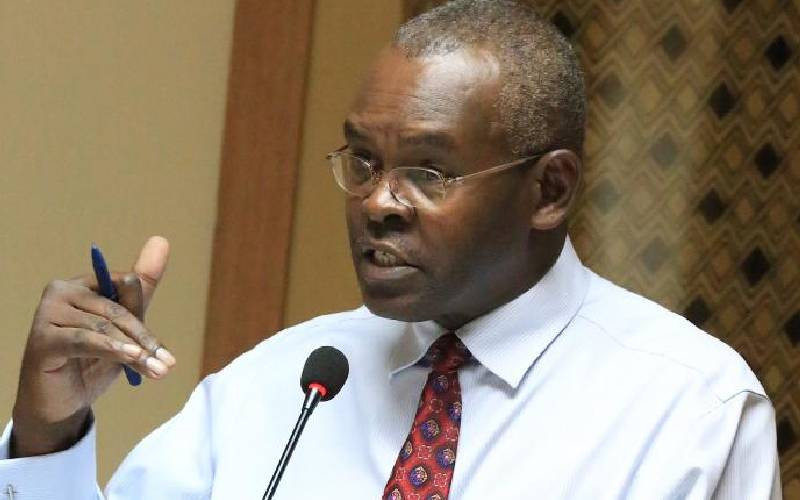Until a few weeks ago, Benson was the proud owner of a thriving electronics business in Nairobi.
But he has since shifted to taxi driving after it became apparent a majority of Kenyans have more pressing needs than buying TV sets, smartphones or laptops during these difficult economic times brought on by the coronavirus pandemic.
“No one is buying electronics anymore. Everyone is just buying food,” he told this writer, who happened to be his first customer after he became a driver affiliated to one of the ride-hailing apps in the country.
Things might be looking up for now, with many Kenyans wary of using public transport due to increased exposure to the virus, but Benson reckons things could change drastically for the industry as the country records more infections by the day.
Long relationship
Just before he closed down his electronics shop, he had approached one of the local banks with which he has had a long relationship for a loan to buy a car for the taxi business.
But he was taken aback by the response he got.
“They told me they had put giving loans on hold,” said Benson.
This flies in the face of the appeal by Central Bank of Kenya (CBK) Governor Patrick Njoroge to commercial banks to help pump cash into an economy fast running out of it.
Treasury Cabinet Secretary Ukur Yatani was equally surprised by Benson’s case when the Financial Standard put it to him yesterday.
“Such banks need to be exposed because they are working against the tenets of the agreement,” said Mr Yatani, adding that the agreement was not CBK’s but was done under the ambit of the Kenya Bankers Association, a lobby group for lenders.
“If you watched the press conference, it was their chair, not CBK, who made the pronouncement.”
But this, according to experts, was bound to happen. They explain that normally, in a crisis, banks cannot loan to businesses closing down and people losing jobs.
People are losing incomes yet banks, according to economist David Ndii, lend on the basis of cash flow.
And according to Euclid Capital CEO Ndoho Wahoro, a former director of the Public Debt Management Office at the Treasury, at a time of crisis, every entrepreneur, including banks, become risk averse.
Stay informed. Subscribe to our newsletter
No one is sure they will get the money back. Some digital lenders are also not approving loans as uncertainty surrounding the pandemic persists.
“Due to the Covid-19 crisis, decisions on loan applications will have delays of up to 10 days,” said Tala in a recent statement to customers.
Tala is among the myriad digital credit providers in the country. They are not regulated by CBK. Other non-regulated digital lenders include Branch, OKash, Senti, Zenka and Okolea. However, there are some like M-Shwari, KCB M-Pesa, Co-op Cash and Timiza, which are provided by commercial banks and thus regulated by CBK.
For digital leaders, President Uhuru Kenyatta’s order for the suspension of the listing of loan defaulters with Credit Reference Bureaus (CRBs) effective April 1 has unnerved them.
Because they largely lend to unsecured borrowers, CRBs are for them the most critical determinant for lending. In a 2019 survey, the Kenya National Bureau of Statistics (KNBS), CBK and Financial Sector Deepening (FSD) found that more than a third of respondents cited a bad or lack of credit history as the main reason they were denied credit by digital lenders.
Without their preferred tool to appraise the creditworthiness of borrowers, some digital credit providers like Tala are now contemplating segmenting their customers into repeat and non-repeat borrowers.
This will leave the credit taps open only to the former, leaving out the latter group.
The biggest losers in an environment where credit flow is sluggish will be those operating micro, small and medium-sized enterprises (MSMEs) like Benson. But even in better times, banks were not lending to small businesses.
Mr Ndoho explained that besides the fact that banks would be close-fisted at this time of crisis, they are also not tailored to lend to MSMEs with no collateral.
“Most of these businesses do not even keep records of their sales, which banks would have used to approve loans,” he said.
A risk analyst who asked not to be named to avoid a conflict of interest added that: “I have zero expectations that the banks will do anything helpful. There would need to be a high degree of moral suasion (an appeal to their conscience) and a tradition of lending freely.”
He continued: “Our banks have a long history of rationing or over-pricing credit facilities; they are not at all set up to lend into a national emergency.”
As of December 2018, out of Sh2.5 trillion that banks had given out in loans, MSMEs’ share was only Sh393 billion – or 16 per cent.
The fraction of bank loans to MSMEs should have been higher as they contribute slightly over a third of the country’s total national output, or Sh3.4 trillion out of Sh10 trillion as of 2015, according to a 2016 KNBS report.
The report also showed that there were about 1.56 million licensed MSMEs and 5.85 million unlicensed ones. They employ about 14.9 million people, many of whom live hand to mouth. This means any shock is likely to drive them into extreme poverty.
Money supply
Policymakers have been burning the midnight oil to forestall grim economic eventualities. As a result, CBK’s monetary policy committee (MPC) – the apex bank’s highest decision-making organ – recently moved to assemble its toolkit to increase the supply of money.
MPC, chaired by Dr Njoroge, slashed the Central Bank Rate (CBR) and Cash Reserve Ratio (CRR) by one percentage point each, signalling banks to provide borrowers with cheaper credit.
The CBR, the benchmark lending rate, was cut from 8.25 per cent to 7.25 per cent. Another monetary policy tool, CRR – or the fraction of cash deposits that banks are required to maintain with CBK daily – was cut from 5.25 per cent to 4.25 per cent.
By cutting CRR, the financial regulator freed up Sh35.2 billion, which it reckons will support distressed borrowers as a result of Covid-19.
As of yesterday, Kenya had so far confirmed 158 cases of the disease brought on by the novel coronavirus. As governor Njoroge confirmed in his post-MPC press briefing recently, ordinarily, it takes at least two months before banks start passing on the benefit of lower credit to borrowers.
But these are not ordinary times. Banks, like other investors, would rather hold on to their money than gamble it away. Fearing that banks might not lend, CBK came up with additional emergency measures. It said the reduction of CRR would be based on willingness to on-lend to customers.
“CBK will (make available) this liquidity to banks based on their demonstrated requirement to directly support borrowers that are distressed as a result of Covid-19,” read part of the statement from the regulator.
This, according to Churchill Ogutu, a research analyst from Genghis Capital, might not work well for small banks, also known as Tier III banks.
“This is a milder form of ‘stick’ on banks to toe the line and will likely be a negative event to the Tier III players who may face an execution risk regarding compliance,” said Mr Ogutu.
Already, CBK has projected that the coronavirus pandemic will slow the economy down from earlier forecasts.
“As a result of the pandemic, economic growth is expected to decline significantly in 2020 from a baseline estimate of 6.2 per cent to possibly 3.4 per cent, arising from reduced demand by Kenya’s main trading partners, disruption of supply chains and domestic production,” said Njoroge in a statement.
He added that the virus is likely to create an unemployment crisis, with the State instituting measures to moderate both the economic and social impact of the pandemic.
But if banks will not be lending broke people and businesses additional cash, they will at least not expect them to pay them back. At least not in the short run. Following a deal brokered by CBK, banks will provide relief on personal loans, which will see borrowers extend their repayment dates by up to a year.
Stanbic Bank has already instituted such a package, announcing a loan holiday for SMEs and its personal banking customers from April 1.
“The reality is SMEs are going through a tough period. We are, therefore, committed to unlocking new solutions to allow them to continue to run their businesses,” said Stanbic Bank chief executive Charles Mudiwa.
[email protected]
 The Standard Group Plc is a
multi-media organization with investments in media platforms spanning newspaper
print operations, television, radio broadcasting, digital and online services. The
Standard Group is recognized as a leading multi-media house in Kenya with a key
influence in matters of national and international interest.
The Standard Group Plc is a
multi-media organization with investments in media platforms spanning newspaper
print operations, television, radio broadcasting, digital and online services. The
Standard Group is recognized as a leading multi-media house in Kenya with a key
influence in matters of national and international interest.
 The Standard Group Plc is a
multi-media organization with investments in media platforms spanning newspaper
print operations, television, radio broadcasting, digital and online services. The
Standard Group is recognized as a leading multi-media house in Kenya with a key
influence in matters of national and international interest.
The Standard Group Plc is a
multi-media organization with investments in media platforms spanning newspaper
print operations, television, radio broadcasting, digital and online services. The
Standard Group is recognized as a leading multi-media house in Kenya with a key
influence in matters of national and international interest.








